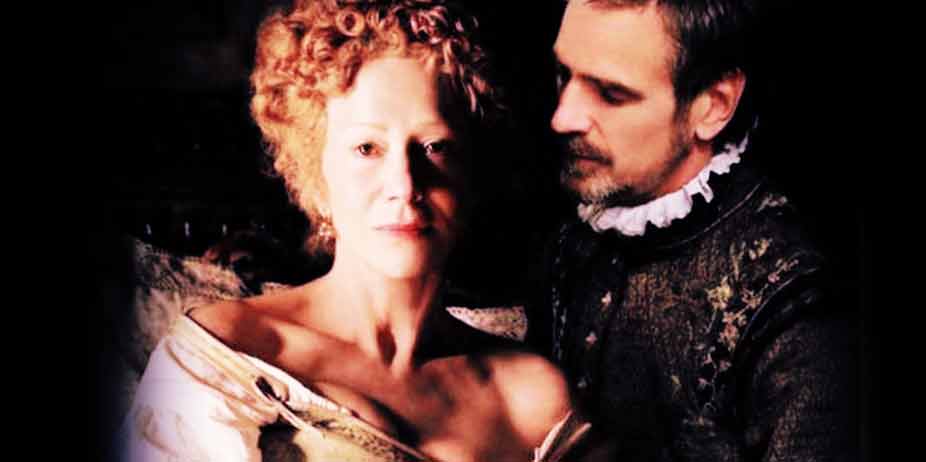
Elizabeth I (2005)
One of the most iconic women in history was Elizabeth I. The daughter of King Henry VIII, she came near to death prior to her ascension to the throne of England, and somehow managed to maintain stability in a time turbulent with political and religious strife. Considered the foremost feminist of her time, she has become a legacy to all the women to follow.
Having remained unmarried on the throne for twenty years, Elizabeth (Helen Mirren) is once more being encouraged to wed by her council. Concerned the Catholic countries of Europe may rise against their protestant nation, an alliance with France is sought. This is most displeasing news to Elizabeth's friend and confidante, the Earl of Leicester (Jeremy Irons). Having loved the queen for many years, but knowing their marriage would never be permitted due to his former entanglements and lowly birth, Robin's prejudice against the Duke of Anjou (Jrmie Covillault) is both out of jealousy and dislike of his Catholic beliefs. The Duke is charming and affectionate, and Elizabeth finds it easy to become fond of him, but much to the consternation of the royal council, her subjects are not in favor of a marriage with France. Forced to abandon her hopes for a happy marriage, Elizabeth is driven through political ambition and necessity to call into question her alliances. Her protector and advisor, Frances Walsingham (Patrick Malahide) is concerned with the threat created by Elizabeth's cousin, Mary Queen of Scots (Barbara Flynn).
Remaining unconvinced that her cousin would plot against her, Elizabeth pleads with Mary to remain loyal, for she does not want to follow in her father's bloody footsteps and order her execution. In the long years that follow, Elizabeth comes near to love a second time (Hugh Dancy), loses someone very dear, is forced to go to war, and is marked by the vindictive Roman Catholic Church as a heathen who should be slain. HBO has given us a very historically accurate adaptation of the politics and rivalries surrounding Elizabeth's reign, but Mirren is the one who gives her humanity. Even when confronted with her barbaric streak, audiences can identify with her, and feel her pain. It was not a simple time, and no choices were ever easy, but it's a testament to her strength that Elizabeth survived when so many wanted her dead. The production value is absolutely magnificent, from the heavily embroidered gowns to the lavish interior of the castle.
Casting was also well done. I was not too happy with Irons in the beginning, but over time he won me over with his quiet approach to the character. Dancy makes a very likable but over the top Earl of Essex, and some of his antics are downright hilarious (if unfortunate, since it only made him a laughingstock). Mirren won numerous awards for her portrayal of Elizabeth, and deserved every single one. The character is as changing as the wind, possessively jealous one moment and flighty the next. Having some experience with HBO's productions in the past, I was surprised with how temperate the content was. There's none of the graphic sexual content that pervades the Hollywood version, and while the scenes of violence are gruesome and startling, there aren't many of them. Certain audiences might be uncomfortable with Elizabeth's passionate romance with Essex, who is a good twenty years her junior, but if you want a crash course in the events that marked her reign, this is a good place to begin.
Sexual Content: The opening sequence has Elizabeth undergoing a
pelvic exam, with the doctor looking under the sheet and
pronouncing that everything is "all right." She is very
affectionate with Robin, but doesn't spend the night in his
chamber when he asks her to. It's never really clear if they
are engaged in any kind of a sexual relationship; and it's
much the same later with the Earl of Essex, who passionately
kisses her several times. Once, he lays her down and it's
implied he arouses her with his hand before she pushes him
away. There is some talk of illegitimate children and forced marriages, and the
occasional mild innuendo. Sketchy dialogue implies the King of Scotland might
favor handsome young men over ladies. Language: Language consists mainly of many uses of whore
and bastard in reference to the illegitimate queen. Violence: There were four gruesome scenes of carnage. We
literally see prisoners being cut open and having
their hearts removed while they are still alive in a
public spectacle. A man's hand is chopped off for
writing nasty things about the visiting French
monarch. There are two graphic beheadings, one of
them requiring a second blow in order to sever the
spine. The heads are held up for the crowd to see. Other: Social drinking.
